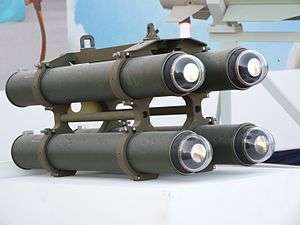LAHAT
| LAHAT | |
|---|---|
|
LAHAT ATGM quad pack for helicopters | |
| Type | ATGM |
| Place of origin |
|
| Service history | |
| In service | 1992–present |
| Used by | See operators |
| Production history | |
| Unit cost | $25,000 (1999)[1] |
| Specifications | |
| Weight | 13 kg (28.7 lb)[2] |
| Length | 975 mm (38.4 in) |
| Diameter | 105 mm (4.1 in)[2] |
| Warhead | Tandem HEAT |
| Warhead weight | 10 kg (22.0 lb) |
|
| |
Operational range |
6,000–8,000 m (6,600–8,700 yd) ground launched 8,000–13,000 m (8,700–14,200 yd) air launched[2] |
| Speed | 285–300 m/s (940–980 ft/s) |
Guidance system | Semi-Active Laser Homing[2] |
Launch platform |
105–120 mm smoothbore rotary-wing aircraft |
The LAHAT (Laser Homing Attack or Laser Homing Anti-Tank, also a Hebrew word for incandescence) is a third generation semi-active laser homing low-weight anti-tank guided missile developed since 1992 and manufactured by Israel Aerospace Industries. It was designed primarily to be fired by Merkava tanks' 105 mm and 120 mm tank guns, though it matches all types of 105 mm and 120 mm guns, including low recoil guns and low-weight guns of military armoured cars.[2] It is also suitable for patrol ships, possibly modified for 105–106 mm recoilless rifles, UAVs, HMMWVs, and SPAAGs.[2] Unlike other tank rounds, LAHAT does not need a tank gun for operation.
Overview

The LAHAT is designed to achieve a 95 percent probability of kill under most conditions.[3] It has a semi-active laser guidance system, capable of both direct and indirect laser designation—the target can be laser-designated by the launching platform (e.g. firing tank) or other platform (e.g. another tank, helicopter, UAV, or forward scouting team), requiring minimal exposure in the firing position. With a low launch signature, the missile’s trajectory can be set to match either top attack (armoured fighting vehicle, warship) or direct attack (helicopter gunship) engagements.
The LAHAT missile has a range of up to 8,000 m (5.0 mi) when launched from a ground platform, and up to 13,000 m (8.1 mi) when deployed from high elevation. The time of flight to a target at 4,000 m (2.5 mi) is 14 seconds and the missile hits the target at an accuracy of 0.7 m (2.3 ft) CEP and an angle of over 30 degrees, providing effective penetration of up to 800 mm (31 in) of RHA armor steel with its tandem warhead to deal with add-on reactive armor.[4][2] LAHAT might also carry embedded active protection system countermeasure capabilities. In any tank the LAHAT is stowed like other rounds in the ammunition rack, and handled just like any other type of ammunition.
The LAHAT was renamed to Nimrod-SR for the Latin American market.[5]
The United States military is considering using the LAHAT as a weapon to arm unmanned aerial vehicles. The missile has been tested on the RQ-5 Hunter.[6]
The LAHAT has been successfully test-fired from a helicopter in demonstrations. Eight missiles were launched at targets up to 10 km (6.2 mi) away from altitudes between 300 and 6,000 ft (91 and 1,829 m). Firings were conducted while the helicopter was hovering, and moving, at targets that were fixed, and moving. One direct hit was scored using the helicopter's observation capability along with laser designation from ground forces.[7]
Operators

Comparable systems
References
- ↑ http://www.afcea.org/content/?q=node/940
- 1 2 3 4 5 6 7 "Lahat Laser Guided Missile". Defense-update.com. Retrieved 10 February 2014.
- ↑ Israel Designs Antiarmor Missile To Fire Out of Tank Guns February 1999 By Mark H. Kagan
- ↑ http://www.arms-expo.ru/news/weapons_in_the_world/indiya_ne_kupit_u_izrailya_protivotankovye_rakety_lahat/
- ↑ Eshel, Tamir. "RAM MkIII Armored Vehicle: Rough and Tough". Defense Update. Retrieved 10 February 2014.
- ↑ Pentagon Plans to Weaponize More Drones - Defensetech.org, 30 December 2013
- ↑ Lahat missile passes complex firing trial - Flightglobal.com, 6 February 2014
External links
| Wikimedia Commons has media related to Lahat missiles. |
